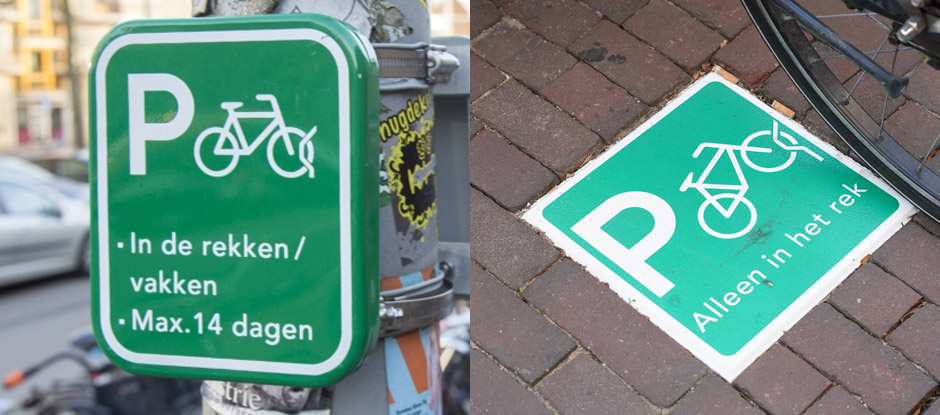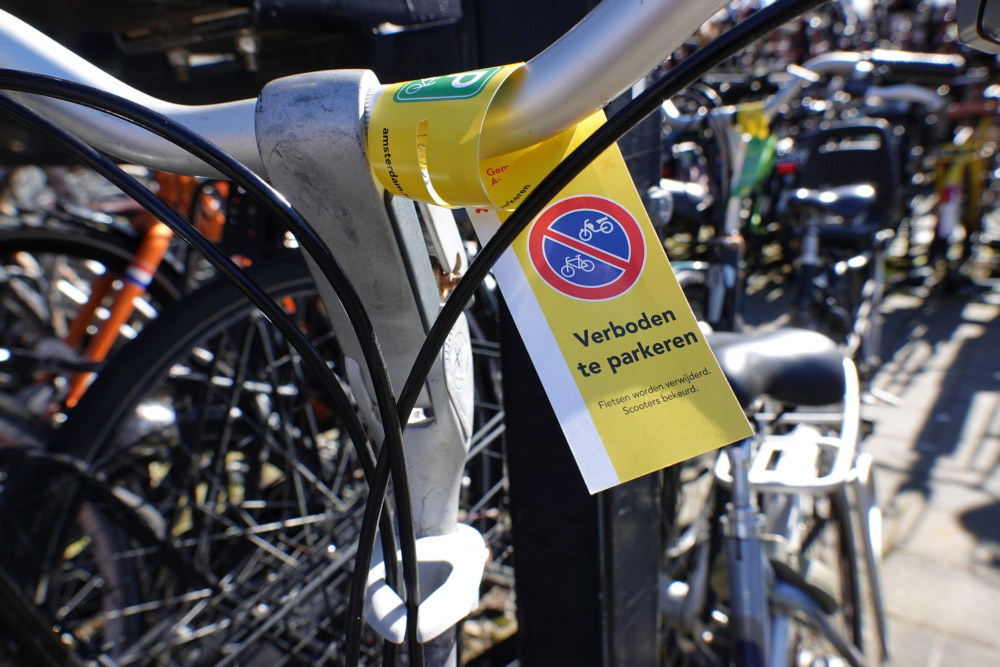Tens of thousands of incorrectly parked bicycles in Amsterdam’s Fietsdepot
Last year, some 70,000 bicycles that were parked incorrectly or for too long ended up in the Fietsdepot, the municipal Bicycle Depot. Only 30 percent of them were collected by their owners. Especially defective bicycles are rarely retrieved.
Anyone interested in what kind of bikes end up at the Fietsdepot should take a look at the website www.verlorenofgevonden.nl. A colourful collection of bikes: expensive VanMoofs, fatbikes, cargo bikes, bikes that are not much more than a, neat bikes with panniers and baskets for a dog. And also rental bikes and shared bikes from Donkey Republic and OV-fiets.
The bicycles, photographed and neatly described with characteristics and reasons for removal, were all brought to the Fietsdepot by the Public Space Supervision and Enforcement Service. The bicycles have been cut away because they have been parked for too long or incorrectly, or haven’t been used for too long. Incorrectly parked bicycles can cause dangerous situations. For example, when emergency services cannot get past them.
In very busy places such as around Central Station, it is forbidden to park bicycles outside facilities. Bicycles placed are outside of the racks are cut away.
Incorrectly parked bicycles are also removed in advance of road work and events such as King’s Day on Dam Square or during Gay Pride.
There are also unused bicycles. Within the A10 ring road (with the exception of city district Amsterdam Noord), bicycles may be parked for a maximum of 6 weeks. In busy areas maximum 2 weeks. Bicycles that are parked longer also end up in the Fietsdepot.
The policy for cutting away bicycles is legally regulated in the General Local Regulation, art. 4.27 section 4 and 2a. Bicycle owners are warned that their bicycle will be taken out with a label on their bike. Depending on the urgency and the location, the bicycle owner is given another 1 hour or another 2 weeks to move their bicycle.
Het wegsleepbeleid is juridisch geregeld in de Algemene Plaatselijke Verordening, art. 4.27 lid 4 en 2a. Fietsbezitters worden voordat de fietsen worden weggesleept, gewaarschuwd. Afhankelijk van de urgentie en de locatie krijgt de fietsbezitter nog een 1 uur of nog 2 weken om hun fiets te verplaatsen. The rules about parking of bikes in Amsterdam can be found here.
Bicycle wrecks on the street are removed immediately, without a warning, and processed in a sustainable way. A bike wreck is a bike that cannot be ridden, that has been neglected or whose repair costs are higher than economic value.

Information about the bike parking rules.
100,000 bicycles in the Fietsdepot
In 2023, 70,000 bicycles arrived at the Fietsdepot in the Western Port Area. A year before, there came 63,000. The expectation for 2024 is a rise up till 80,000 bicycles.
Martin Klepper, location manager of the Fietsdepot: ‘Just like the number of residents, the number of bicycles in the city is increasing, and nowadays quite some residents own more than one bicycle.’
It is not that people are becoming more careless about parking their bike just anywhere. Klepper: ‘The percentage of bikes being retrieved and behaviour have not changed much over the years. Around 50 percent of the bikes in good shape are collected, and between 1 and 7 percent of the bikes in poor shape.’ In total, less than 30 percent of the bikes that arrive at the Fietsdepot are collected again by their owner. The last years there are also more often electric bikes among the bikes brought to the Fietsdepot. And even not all of those are collected.
Shorter retention period
To make room in the Fietsdepot, the retention period for bicycles at the depot has been shortened from 6 to 4 weeks since September. Klepper: ‘We noticed that most owners that collect their bicycle do that in the first 4 weeks. This way, we can make better use of the freed-up space. For the years to come, we expect 100,000 bicycles per year.’
The Fietsdepot works hard to give people their bicycles back. They check whether the bicycle has been registered as stolen. If that is the case, the bicycle will be returned in collaboration with the police. Of the other bicycles a detailed description is put online. People who recognize their bicycle can pick it up – after paying 25 euros in administration costs – or have it delivered to their home for a total of 40 euros. All in all, the process of registering, storing, preserving and returning the bicycles costs the municipality around 40 euros per bicycle.
Bicycles that are not collected are donated to various social initiatives if they are in good condition or if they can be repaired,’ says Klepper.








